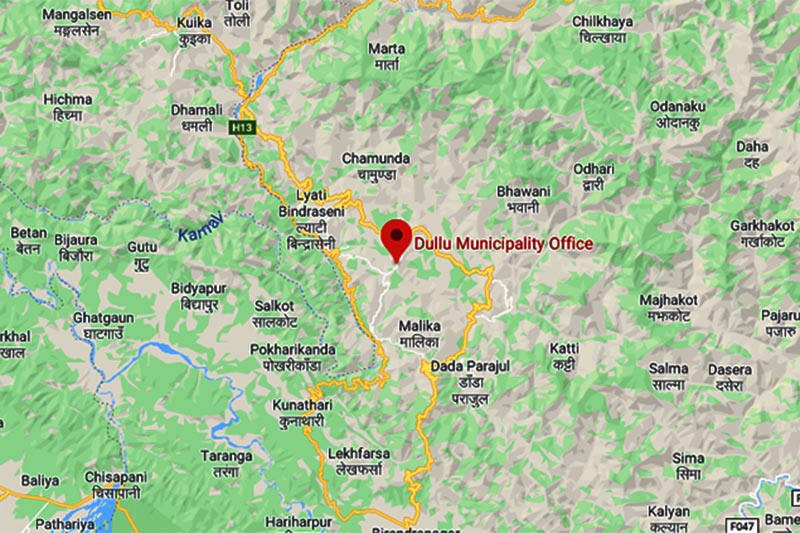Dailekh reels under scarcity of tests as people return to district in thousands
KATHMANDU: As thousands of people are returning home to Dailekh from India, the district faces a shortage of PCR tests, increasing the risk of widespread transmission of Covid-19 among the locals.
Returnees from India, who are placed in various quarantine facilities in Dailekh district, are at a risk of contracting the infection as enough PCR tests are not being carried out and reports have been delayed for the samples that were collected.
All 38 quarantines in Dullu Municipality have already been crammed with the returnees, said Gyan Mani Nepal, Chief Administrative Officer of Dullu Municipality in Dailekh.
At least 2,322 migrants have arrived in the municipality till Sunday. Hundreds of returnees from India’s Maharastra and Gujarat states arrived yesterday on eight to ten buses while at least 10,000 returnees are expected to arrive in the municipality within a few days, Nepal told THT Online. A total of 42,000 migrant workers have been expected to arrive in the district in a few more days.
Nepal said, the major problem the district is facing right now is the lack of sufficient tests through Polymerase Chain Reaction (PCR) method. They do not have a machine to carry out the same. He also stated that carrying out Rapid Diagnostic Tests (RDT) at the moment is of no significance because it does not guarantee the correct diagnosis of COVID-19.
He added that the local administration could mobilise local human resources for managing the tests if a PCR machine was made available. Nepal further said the municipality had only two doctors who have now gone into quarantine after they came in contact with the pregnant woman and a child who were detected with the viral infection, while collecting swab samples.
As a result, the only hospital in Dullu Municipality in Karnali Province is unable to provide health services, he said. The hospital had been providing health services to locals, along with people from Kalikot and Achham districts.
Chief Administrative Officer Nepal said that if a PCR machine were to be made available to the local hospital, it could manage to test at least 600 swab samples a day with the help of locals qualified as lab technicians.
Moreover, limited number of security personnel in the district have to oversee multiple quarantine facilities. A total of 18 security personnel have to monitor quarantine centres in Dullu in addition to those in Chamunda Bindrasaini and Bhairavi Municipalities.
Meanwhile, the returnees from India have demanded that they be tested soon and their test reports be made available at the earliest so that they could leave the quarantine and go back home or the facilities be improved, Nepal said. Those in quarantine are worried that negligence in managing a safe facility might put them in further risk of contracting the infection from one another.
"What these people are saying is also right as they do face risk of transmission in the facilities. If we were able to conduct mass tests, then we could put the infected ones in isolation and ask the remaining to stay in home quarantine, which is not possible as of now."
The municipality has been spending Rs 1,600 per person for the rescue of migrant workers returning home. The buses are being arranged to ferry them from the border area to various quarantines in the district.
Nepal quoted House of Representatives (HoR) member Raj Bahadur Budhachhetri -- elected from Dailekh Constituency -- as saying that lawmakers’ development fund could manage to purchase a PCR machine but procurement of the equipment would take some time as the process has to go through a legal course.
According to Nepal, 200 swab samples sent for PCR testing to Karnali Academy of Health Sciences (KAHS) in Jumla, on Thursday, revealed that seven cases of coronavirus infection was detected so far and further test reports are yet to be received by the municipality. It has been reported that those infected by the novel coronavirus include a pregnant woman and a two-year-old child.
Likewise, the municipality has yet to receive the PCR test reports of 26 other samples sent to the Surkhet Provincial Hospital on Saturday, and 116 the following day. Nepal fears that the infection may spread in the community until PCR testing is increased and reports are delivered on time.
He opined that delayed test and delivery of test reports could make things worse as the returnees from India are flocking the quarantines. They have to wait for the test reports before they can be sent home.
Furthermore, the available quarantine facilities lack adequate space for physical distancing and other standard requirements.
"We are competent to handle this crisis if we receive a little more support from the centre. I hope our plight reaches those who need to know it and that we're able to address what could turn out to be a huge health crisis, in time," Nepal concluded.






